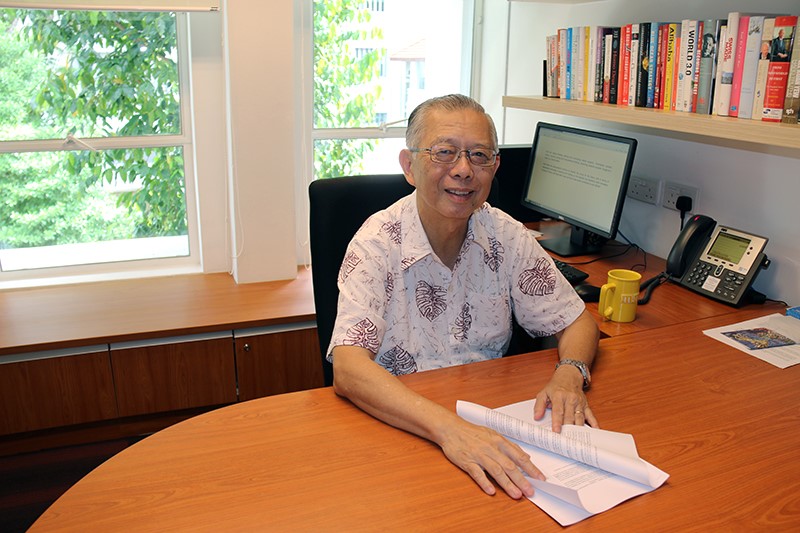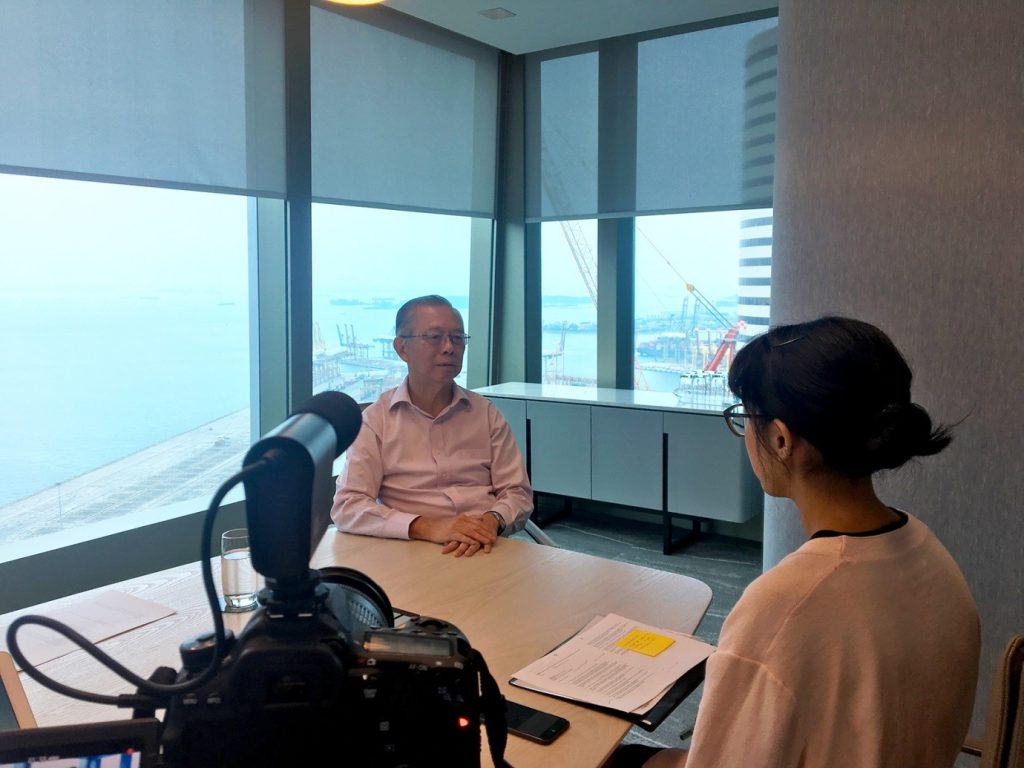LIM Siong Guan is the Institute of Policy Studies’ 4th S R Nathan Fellow for the Study of Singapore. Formerly Head of the Singapore Civil Service, Mr Lim is currently Group Advisor to the Group Executive Committee of GIC Private Limited (GIC). He was Group President of GIC from 2007 to 2016, and Chairman of the Economic Development Board from 2006 to 2009.
Nicknamed “Yoda”, the Jedi Master in Star Wars films, Mr Lim is an exemplar of leadership to many who have worked with him. From September to November 2017, Mr Lim will deliver three IPS-Nathan Lectures, collectively titled “Can Singapore Fall?” We caught up with Mr Lim to talk about his plans for the upcoming lectures, his thoughts on the relationship between government and people, and how he manages his time in doing seemingly endless amounts of work.

Mr Lim in his office at the Lee Kuan Yew School of Public Policy.
Q: What are some of the key ideas you would like to deliver, as S R Nathan Fellow?
Lim Siong Guan (LSG): I thought I should try to answer the question, “Can Singapore Fall?” in my upcoming lectures. Obviously, I’ve spent much of my life working on “how we can make Singapore strong, independent and sovereign,” and “how we can get the conditions needed for Singapore to succeed.”
So, I naturally have a concern about Singapore in the future, whether it can fall, and what we can do to make sure that we can look forward to a Singapore where our grandchildren or great grandchildren have the maximum number of opportunities
Q: What was the biggest lesson that you took away from your time in the civil service?
LSG: Perhaps it is that running a country is not the same as running a company. When you run a company, you say, “Who are the best in terms of talent and abilities?” And you create conditions to harness that. At the same time, you look at the people who are not doing very well and you say, “We can either train you to do your job well, or put you somewhere else where you can do better.”
When you run a country, you cannot think like that. You have to think in terms of, “Is there a place for everyone? How do you reach out to the talent and abilities among the whole population? How can we create an environment and a life that people find satisfying?”
This is really what we ought to be as a nation: think about how we can help Singaporeans be the best that they can be, so that they have the greatest sense of self-worth and achievement — each one as an individual, and also working together as a community.
There’s a quote that I like very much by Rosabeth Moss Kanter, a professor at Harvard Business School. It says that financial statements are a lagging indicator of a company’s health. She says, “They [financial statements] tell you what you’ve just done. They don’t predict the future. Culture is a leading indicator. Culture predicts the future.”
Q: What culture or values should we aspire to?
LSG: When you talk about values, the first point I want to make is: Think about the future. By definition, nobody has been there. Therefore, there are no maps. When there are no maps, you better take your compass and trust it.
We can say, “Of course there can be maps. Why doesn’t Singapore just look around to see what other people are doing elsewhere in the world? And because they have done it, it represents a map that we can follow.” But Singapore is uniquely different.
If we look at any map of the world, Singapore is often smaller than the letter “O” in the names of countries; whereas many countries can fit their name within their geographical boundaries on the map.
That immediately makes Singapore uniquely different, and we in Singapore need to get comfortable with the fact that we have to do things and think in ways that are different and unique. If we are different and unique, it is not that we can’t get valuable lessons looking at what other people do. But we need to recognise that, because we are different and unique, there will be things that we ought to be doing, which nobody else is doing, simply because they are not in the same situation as us.
So because there are no maps, there needs to be a compass — a set of values and beliefs to give Singapore the maximum chances of success in the future. It includes the fact that Singapore is a brand about trustworthiness, and that we are multiracial, multilingual, multicultural, and multi-religious.
Values could also be about our belief in innovation. It could be about the courage to try out new things, being prepared to work hard, and so forth. I think several people have expressed this sentiment, one of whom is computing pioneer Alan Kay, who says, “The best way to predict the future is to invent it.” Well, if we really believe that, we better have the spirit within ourselves to create stuff, rather than only doing things that other people have done.

Mr Lim being interviewed by IPS at the GIC office.
Q: Do you think that Singaporeans don’t think enough about the future, or how would you characterise their approach towards it?
LSG: Well, it’s an adjustment process. The thing about Singaporeans is, Singaporeans are smart. They’re smart to the point of being highly efficient. They say, “Where am I trying to get to? What’s the fastest way to get there, the shortest cut for getting there?” Singaporeans are very good at that.
The issue is that the way the world is moving and the way opportunities are coming up are all different fundamentally because of speed. Life has accelerated. In the past, because things changed slowly enough, we could say, “Well, if only I learned to do the jobs of today, I’ll be okay for a lifetime.”
But now, there are people who say that our children will have 10 different kinds of jobs during their lifetime. Now, that’s a totally different dimension. We would need to be clear about the qualities and the values that will allow us to make those adjustments.
An understanding of this is a lot more important than saying, “What are the skills that I need?” It is attitudes towards life and work —the values that we carry, that are a lot more important than skills. We cannot continually think of the future and work in terms of skills; it is really about having a perspective that recognises that things are changing, and that life is a lot more dynamic these days.
Q: What then is the role of the government in this future, and its relationship to the people?
LSG: Going into the future, we are entering a dimension where people’s own perspective of the government has to change. We are no longer in a dimension where the government can deliver all the things that people need in life. We need to recognise that the government has to give the basics to people, in terms of an environment of peace and security.
But we’re coming to a stage where the multiplicity of the hopes and wishes and demands of the people is no longer one where the government can boil it down, and say, “This is what I deliver.” It’s now one where we say, “The government can offer the basics and the opportunity for you to be the best that you can be; the rest is up to you.”
This is because families now have the financial wherewithal to give these opportunities and choices to their children. So while people now have greater capacity for choice, they also have to adjust to the fact that this is a world less and less of the government delivering the material goods to them.
Q: You’ve written two books, on honour and leadership. What is the gist of what you want people to take away from these books?
LSG: The first book is The Leader, The Teacher and You. It is just an expression of what I believe is important for leadership. Superior leadership requires leaders who have the heart of a teacher; one who helps people become the best they can possibly be, according to what their innate capabilities are — their skills, knowledge, and so forth
Winning with Honour, which is my second book, started off as an attempt to try to understand how Singapore has managed to survive and succeed since independence. My conclusion, as I reflected on it, was that Singapore has succeeded for two basic philosophical or ideological foundational reasons. The first is that Singapore is a brand about trustworthiness. The second is more about the multiracial, multi-religious aspect of Singapore; how, as a society, despite our differences, we honour one another, give space to one another, and appreciate the fact that we are different.
And this idea about trustworthiness and honouring your word, respecting and appreciating other people, actually applies to virtually every aspect of life. It applies to families, to leadership in companies, to the community, the way we treat our neighbours, and the way we look at the people that we interact with.
Both the books have a common theme, and that is about other-centeredness. Thinking of other people instead of just ourselves, as a formula by which to succeed in life and work, and to be the best that we can possibly be.
Q: One of the traits that you’re well known for is your thrift. Is there anything you splurge on, or see as a “guilty pleasure”?
LSG: Thrift… yes, it pervades the way I think. But mostly because of my background, right? My father was a taxi driver and my mother was a teacher; there was no way I could have gone to university without a scholarship. I mean, they brought me through, at the time, what was called pre-university. But that was as far as they could bring me. There was a sense about spending not just money, but spending time on what is worth spending time and money on.
So, in terms of splurging and so forth, I must admit that that’s a little difficult for me. All of us are a reflection, in a way, of how life was, in our younger days.
Q: You continue to contribute to Singapore in various capacities, and you are still very active. What keeps you going and how do you find the energy?
LSG: I think all of us are going to be able to find time and energy to do whatever we consider to be important for our lives. Everybody can complain about how work is so terrible and the hours they work, but if you have a party on Friday night, I assure you that you will find the time and energy to get to your party on Friday night, despite everything!
What keeps me going is just this sense of, “Do what I can to be useful and helpful, and to be the best that I can be in terms of what can I contribute.” And what gives me enormous satisfaction is to help other people be the best that they can be.
If there is a situation where I think I can do something that is useful and helpful, and I don’t see other people coming to do it, then yes, I’ll go in and do it.
Mr Lim’s first lecture, “The Accidental Nation”, will take place on 12 September, 6 pm. Register here.
Fern Yu is a Research Assistant (Special Projects) at IPS. She contributes to the work of the S R Nathan Fellowship for the Study of Singapore.
Download